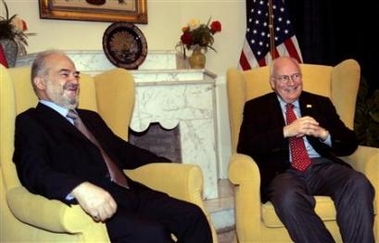|
Cheney visits Iraq amid surge of violence
(AP)
Updated: 2005-12-19 08:32 Iraqi authorities were still tallying the ballots that will determine the
allocation of the parliament's 275 seats for four-year terms.
The election commission said it had received raw preliminary results in the
form of tally sheets from seven provinces representing about 70 percent of the
total vote. Official Safwat Rashid said that they included Baghdad, Babil,
Karbala, Najaf and Irbil, Anbar and Kirkuk and that the rest were "on their
way."
He added that on Monday "we'll be able to provide you with 80 percent of the
results for Baghdad province. The rest will be completed in the coming days."
Rashid said the commission had so far received 345 complaints about the
election, more than half claiming violations of campaigning rules. Other
complaints were about names missing from voter rolls and some alleged
interference with voters by party officials, police or elections workers.
The commission began examining complaints Sunday. "Some of the complaints are
minor and others may be grave enough to cancel the results of a ballot box,"
Rashid said.
The complaints have to be dealt with before election results are released, a
process that officials have said would take about 10 days.

U.S. Vice President Dick Cheney (R) meets with
Iraqi Prime Minister Ibrahim al-Jaafari in Baghdad December 18, 2005.
[Reuters] | Shiite Arabs account for about 60
percent of Iraq's estimated 27 million people, compared with 20 percent for
Sunni Arabs and a similar proportion for Kurds. Both Shiite and Sunni political
leaders have said they likely will have to form a coalition Cabinet to govern.
At least one hardline Sunni Arab politician, Saleh al-Mutlaq, said Sunday
that the big turnout was a sign that insurgents are ready to participate in the
political process. A number of militant groups pledged not to attack polling
stations to allow Sunni Arabs to vote.
"Not participating in the previous elections was a mistake," said al-Mutlaq,
who heads the Iraqi Front for National Dialogue. "By abiding to its promise not
to attack the voting process, the resistance has proved that it is ready to lay
down its arms if the dialogue and democratic process is genuine."
Al-Mutlaq said a coalition of all groups was necessary, otherwise the "scheme
of dividing Iraq on the basis of Shiites and Sunnis, Kurds and Arab is looming."
In Berlin, German Foreign Minister Frank-Walter Steinmeier offered no details
in announcing the release of aid worker Susanne Osthoff, saying only that she
was free and now at his country's embassy.
Osthoff, 43, and her Iraqi driver disappeared Nov. 25 in northern Iraq. Days
later, the two were shown in a videotape blindfolded and sitting on a floor,
with militants �� one armed with a rocket-propelled grenade �� standing beside
them.
The captors threatened to kill the hostages unless Germany stopped dealing
with the Iraqi government. German Chancellor Angela Merkel responded that her
country would not be "blackmailed."
While Germany strongly opposed the U.S.-led invasion of Iraq and refused to
send troops here, it does train Iraqi soldiers and police outside this
country.
|